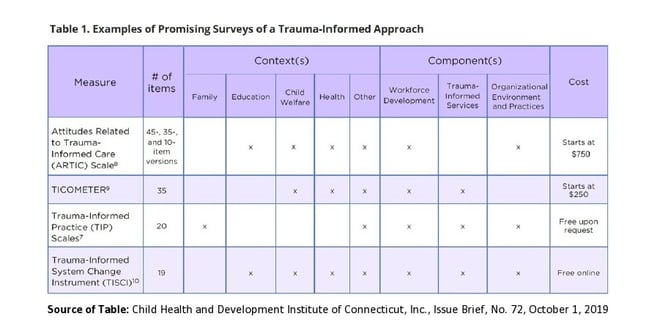While efforts to implement trauma-informed care are trending, TIC measurement is still in its infancy. So, as human service, education, and health organizations increasingly strive to become trauma-informed, it’s essential to measure whether desired results are being achieved.
In 2019, the Child Health and Development Institute of Connecticut, Inc. (CDHI) issued an important brief on TIC measurement, Are We Trauma-Informed? Tools to Measure Progress in a Program, School, or Organization. The brief summarized findings from the peer-reviewed literature including an article, Systems Measures of a Trauma-Informed Approach: A Systematic Review (Champine, et. al. 2019), from the American Journal of Community Psychology.
The article’s authors from CHDI, the Yale School of Medicine, and the Medical University of South Carolina, identified and examined the qualities of 49 survey tools of trauma-informed care. Of those surveys, they selected only four as the most promising tools now available, including the Attitudes Related to Trauma-Informed Care (ARTIC) Scale (see Table 1).
Compared to other measures, the ARTIC Scale was highlighted because:
- It has evidence of reliability (the degree to which the survey produces similar results under the same conditions) and validity (degree to which it measures what it claims to measure)
- It is applicable across contexts and settings (i.e., education, child welfare, health, and other) rather than developed for a specific intervention
- It measures multiple elements of TIC rather than only one
The ARTIC Scale is a measure of professional and para-professional attitudes favorable or less favorable toward trauma-informed care. As noted in a peer-reviewed journal article in School Mental Health Development and Psychometric Evaluation of the Attitudes Related to Trauma-Informed Care (ARTIC) Scale (Baker et. al., 2016) “Attitudes more or less favorable to TIC are thought to be one important driver of this behavior.” This makes the ARTIC Scale an excellent tool for tracking the impact of initiatives aimed at promoting workforce development and overall change in organizational culture.
Now, the Online ARTIC offers the same valid and reliable ARTIC Scale in an online platform. By offering easy and efficient data collection through use of a smart phone, tablet or computer, for up to 8 time points over three years, the Online ARTIC is a powerful tool for assessing change in staff attitudes over time. The Online ARTIC also provides automated data analysis and generates dashboard results for agencies and confidential dashboard results for individual survey participants, making the Online ARTIC a powerful tool for data-driven decisions about trauma-informed care.
References:
Baker, C.N., Brown, S.M., Wilcox, P.W., & Overstreet, S. (2016). Development and psychometric evaluation of the Attitudes Related to Trauma-Informed Care (ARTIC) Scale. School Mental Health, 8:61-76.
Champine, R. B., Lang, J., Nelson, A. M., Hanson, R. F., & Tebes, J. K. (2019). Systems measures of a trauma-informed approach: A systematic review. American Journal of Community Psychology, 64:418-437.
Child Health and Development Institute of Connecticut, Inc. (October 2019). Issue Brief 72: Are We Trauma-Informed: Tools to Measure Progress in a Program, School, or Organization.
Learn more at articscale.org
Measure what matters, measure trauma-informed care


